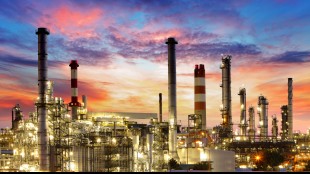
-
 France mourns Mayotte victims amid uncertainy over government
France mourns Mayotte victims amid uncertainy over government
-
UK economy stagnant in third quarter in fresh setback

-
 Sweden says China denied request for prosecutors to probe ship linked to cut undersea cables
Sweden says China denied request for prosecutors to probe ship linked to cut undersea cables
-
African players in Europe: Salah leads Golden Boot race after brace

-
 Global stock markets edge higher as US inflation eases rate fears
Global stock markets edge higher as US inflation eases rate fears
-
German far-right AfD to march in city hit by Christmas market attack

-
 Ireland centre Henshaw signs IRFU contract extension
Ireland centre Henshaw signs IRFU contract extension
-
Bangladesh launches $5bn graft probe into Hasina's family

-
 US probes China chip industry on 'anticompetitive' concerns
US probes China chip industry on 'anticompetitive' concerns
-
Biden commutes sentences for 37 of 40 federal death row inmates

-
 Clock ticks down on France government nomination
Clock ticks down on France government nomination
-
'Devastated' Australian tennis star Purcell provisionally suspended for doping

-
 Mozambique on edge as judges rule on disputed election
Mozambique on edge as judges rule on disputed election
-
Mobile cinema brings Tunisians big screen experience

-
 Philippines says to acquire US Typhon missile system
Philippines says to acquire US Typhon missile system
-
Honda and Nissan to launch merger talks

-
 Police arrest suspect who set woman on fire in New York subway
Police arrest suspect who set woman on fire in New York subway
-
China vows 'cooperation' over ship linked to severed Baltic Sea cables

-
 Australian tennis star Purcell provisionally suspended for doping
Australian tennis star Purcell provisionally suspended for doping
-
Asian markets track Wall St rally as US inflation eases rate fears

-
 Luxury Western goods line Russian stores, three years into sanctions
Luxury Western goods line Russian stores, three years into sanctions
-
Wallace and Gromit return with comic warning about AI dystopia

-
 Philippine military says will acquire US Typhon missile system
Philippine military says will acquire US Typhon missile system
-
Afghan bread, the humble centrepiece of every meal

-
 Honda and Nissan expected to begin merger talks
Honda and Nissan expected to begin merger talks
-
'Draconian' Vietnam internet law heightens free speech fears

-
 Israeli women mobilise against ultra-Orthodox military exemptions
Israeli women mobilise against ultra-Orthodox military exemptions
-
Asian markets track Wall St rally as US inflation eases rate worries

-
 Tens of thousands protest in Serbian capital over fatal train station accident
Tens of thousands protest in Serbian capital over fatal train station accident
-
Trump vows to 'stop transgender lunacy' as a top priority

-
 Daniels throws five TDs as Commanders down Eagles, Lions and Vikings win
Daniels throws five TDs as Commanders down Eagles, Lions and Vikings win
-
'Who's next?': Misinformation and online threats after US CEO slaying

-
 Only 12 trucks delivered food, water in North Gaza Governorate since October: Oxfam
Only 12 trucks delivered food, water in North Gaza Governorate since October: Oxfam
-
Telomir Pharmaceuticals Confirms Copper Binding Capabilities of Telomir-1 and Expands Pipeline Into Wilson's Disease

-
 Datametrex Cancels RSUS
Datametrex Cancels RSUS
-
South Star Battery Metals Announces Upsize of Non-Brokered Private Placement to Raise Up to US$3.20M, Extends Closing and Amended and Restated Stream Agreement

-
 Brightline Interactive Successfully Delivers A Scalable Immersive Simulation To A Global Government Service Integrator, Positioning Itself As A Leading Operating System For Processing And Visualizing Complex Information In 3D Space
Brightline Interactive Successfully Delivers A Scalable Immersive Simulation To A Global Government Service Integrator, Positioning Itself As A Leading Operating System For Processing And Visualizing Complex Information In 3D Space
-
Urb NM is Named "Fastest Growing" Marijuana Brand in New Mexico

-
 Alset AI Broadens Investment Policy to Embrace Decentralized AI, Quantum AI, Quantum Computing, and Cryptocurrency Opportunities
Alset AI Broadens Investment Policy to Embrace Decentralized AI, Quantum AI, Quantum Computing, and Cryptocurrency Opportunities
-
Strawberry Fields REIT Enters Into Agreement for Six Healthcare Facilities Located in Kansas

-
 NanoViricides is in a Great Position to Fight Potential Bird Flu Pandemic with a Drug that the Mercurial H5N1 Influenza A Virus is Unlikely to Escape
NanoViricides is in a Great Position to Fight Potential Bird Flu Pandemic with a Drug that the Mercurial H5N1 Influenza A Virus is Unlikely to Escape
-
Zomedica Launches Two New Quantitative Assays on the TRUFORMA(R) Platform: Canine NT-proBNP and Progesterone

-
 MainStreetChamber Holdings, Inc. Submits 15(c)211 Application
MainStreetChamber Holdings, Inc. Submits 15(c)211 Application
-
InterContinental Hotels Group PLC Announces Transaction in Own Shares - December 23

-
 Melrose Group Publicly Files Complaint to the Ontario Securities Commission
Melrose Group Publicly Files Complaint to the Ontario Securities Commission
-
Langers edge Tiger and son Charlie in PNC Championship playoff

-
 Explosive batsman Jacobs gets New Zealand call-up for Sri Lanka series
Explosive batsman Jacobs gets New Zealand call-up for Sri Lanka series
-
Holders PSG edge through on penalties in French Cup

-
 Slovak PM Fico on surprise visit to Kremlin to talk gas deliveries
Slovak PM Fico on surprise visit to Kremlin to talk gas deliveries
-
Daniels throw five TDs as Commanders down Eagles


Lithium-rich Bolivia lags behind in race to mine key metal
In a patch of South America rich in lithium, used to make batteries for electric cars and other tech, Bolivia is lagging behind its neighbors in the race to mine the key metal.
An area called the Lithium Triangle which spills over the borders of Bolivia, Chile and Argentina is home to 60 percent of the world's lithium reserves, according to the US Geological Survey.
Bolivia claims to have Earth's largest deposit of the metal, used to make rechargeable batteries for smartphones, laptops and other devices besides e-vehicles.
But Bolivia has undertaken only four pilot projects and is running just one plant to produce the metal -- and at 20 percent of its capacity.
"The next step was going to be taking this up to an industrial level. And this has not been achieved so far," said Gonzalo Mondaca, a researcher at the Bolivian Center for Documentation and Information.
In 2023 Bolivia produced 948 tonnes of lithium carbonate, a white salt that is a precursor to the compounds used in lithium-ion batteries, according to the Mining Ministry.
Based on US estimates, that is one-tenth of what Argentina extracted from the earth and just two percent of the haul in Chile, the world's largest producer after Australia.
"The term Lithium Triangle is confusing because it suggests that the area is homogenous," said Martin Obaya, a researcher at San Martin National University in Argentina.
"But it varies from one country to the next and one region to the next."
- Window of opportunity? -
In South America, lithium lies in salt flats. The cheapest way to extract it is to pump water up from underground deposits and let it sit in pools to evaporate, leaving the lithium carbonate from which the metal is derived.
In Chile, where the lithium is found in the Atacama desert, engineers can dig down dozens of meters (yards) into the salt flats.
But this is not possible at Bolivia's Uyuni salt flat, the world's biggest, which lies at an altitude of 3,600 meters (12,000 feet).
There, crews can bore down only about 11 meters, as below that the soil is too compact and it's impossible to pump water up to the surface, Mondaca said.
In December 2023, the government opened a plant that was supposed to yield 15,000 tonnes per year of lithium carbonate using the evaporation technique. But the plant did not work properly and it is now operating at only 20 percent capacity.
"There will always be debate over whether we are facing a window of opportunity that is about to close. It is hard to say. But the project's performance is frustrating, given the expectations," said Obaya.
In recent months Bolivia raised hopes by signing two contracts for the construction of plants using electro-chemical processes to extract lithium.
This method requires less water but a larger investment up front.
- Political deadlock -
The state lithium company YLB says that with the new technique, producing a ton of lithium at the Uyuni facility will cost between $4,000 and $8,000, compared to $2,500-$4,000 in Chile.
This year Bolivia signed a deal with a Russian company called Uranium One to build a plant designed to extract 14,000 tons of lithium per year.
It also signed a contract with a subsidiary of the Chinese company CATL -- the world's largest battery manufacturer -- to set up two lithium extraction sites with a joint capacity of 35,000 tonnes a year.
Both of these contracts require approval from congress, where the ruling party's majority is divided between supporters of President Luis Arce and those who back former president Evo Morales. These former allies are now sworn enemies.
Mondaca said Bolivia is simply not prepared for this big lithium challenge "at the technical, legal and institutional level."
Gustavo Lagos, a professor at Catholic University in Chile, said 20 or 30 years from now Bolivia will be able to produce a lot of lithium. But it needs cheaper technology and "we are not there yet."
The government says Bolivia has the world's largest lithium resources but has never stated how much of it can actually be extracted.
"If the government of Bolivia has succeeded in anything it was in propaganda. It has kept people's hopes up for more than 15 years," said Mondaca of the Bolivian research group.
S.Gregor--AMWN